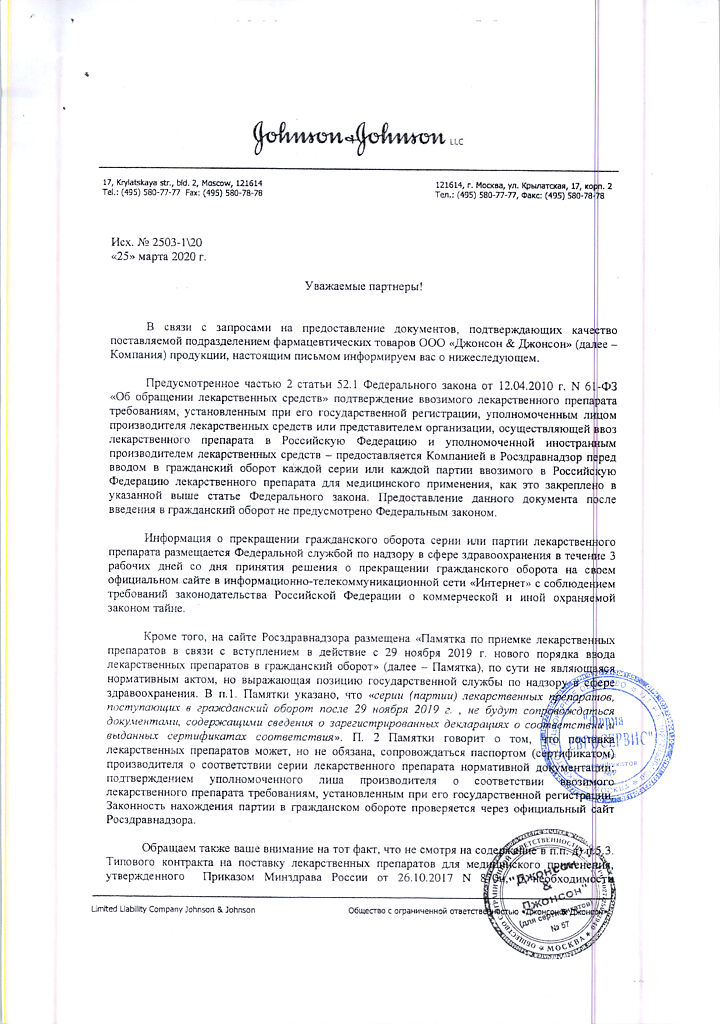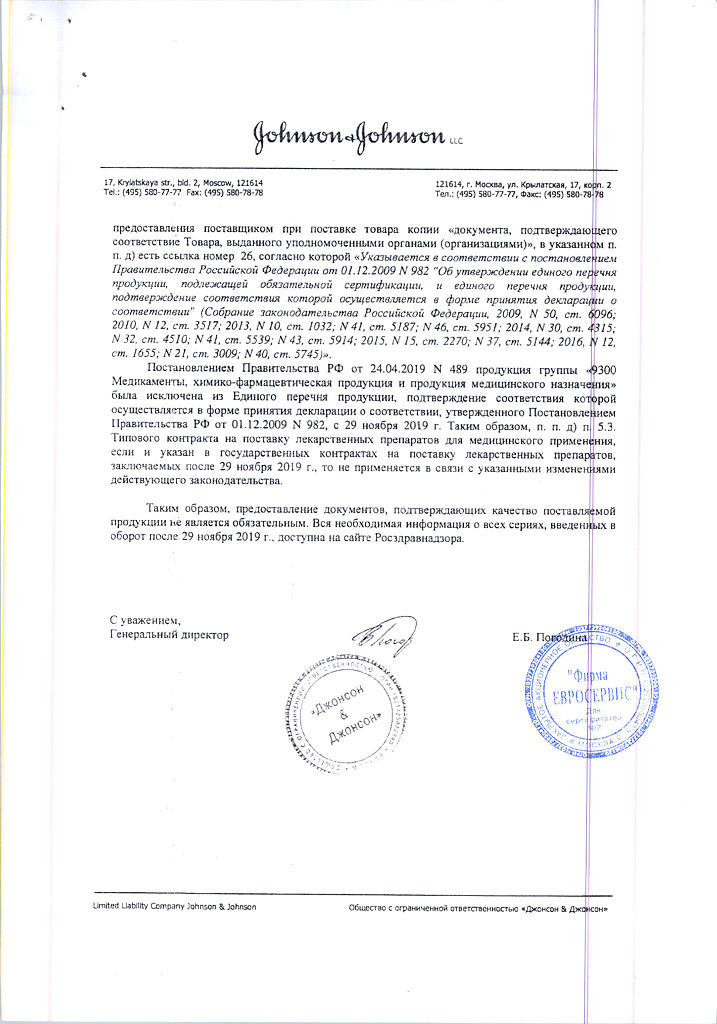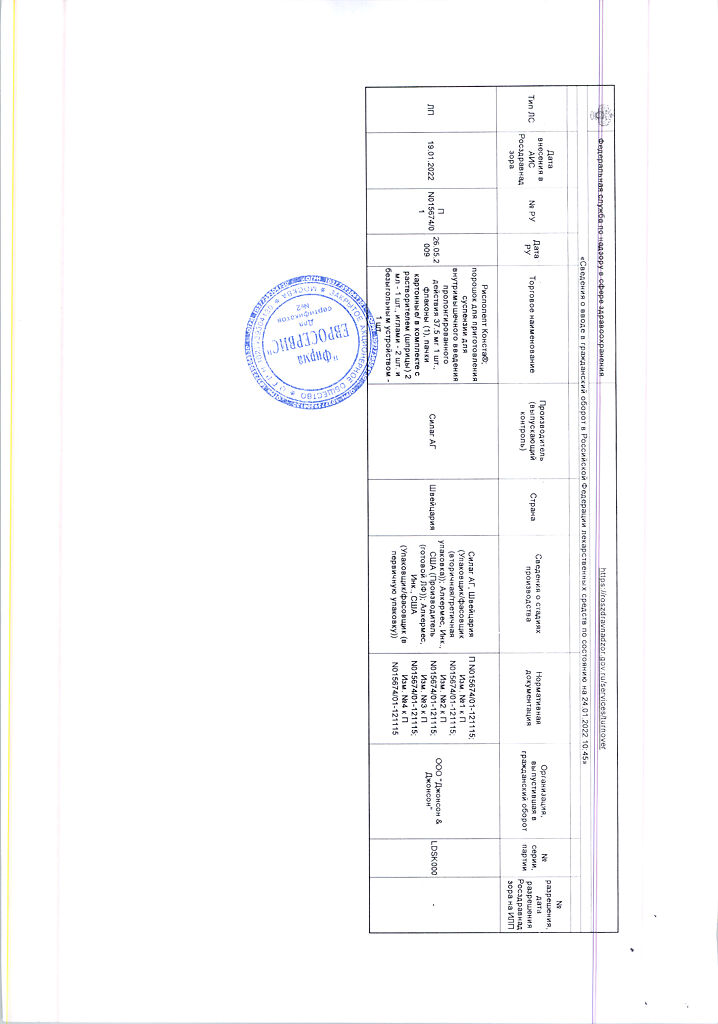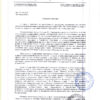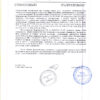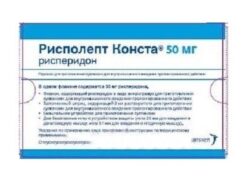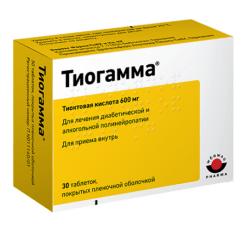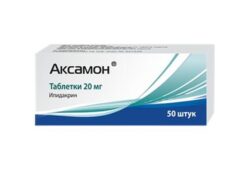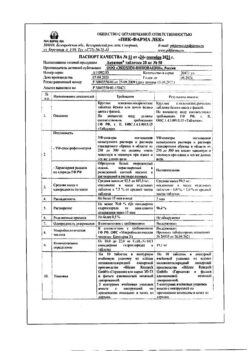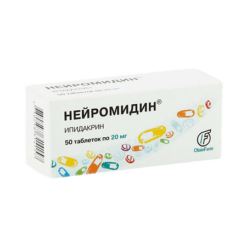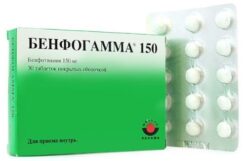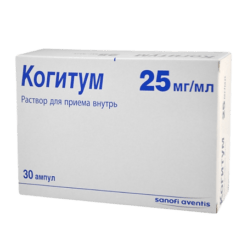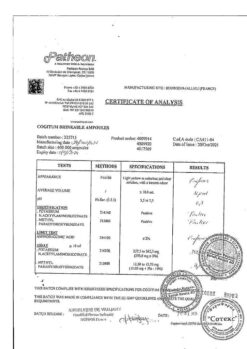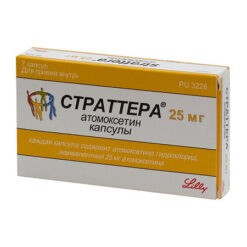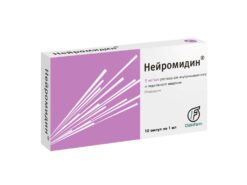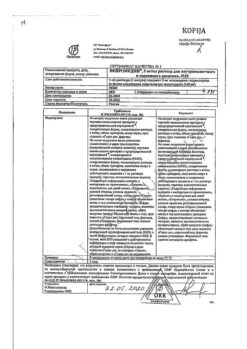No products in the cart.
Rispolettes Consta, 37.5 mg
€1.00
Out of stock
(E-mail when Stock is available)
Description
Risperidone is a selective monoaminergic antagonist. It has high affinity for serotonergic 5-NT2 receptors and dopaminergic D2 receptors. In addition, risperidone binds to α1-adrenergic receptors and, to a lesser extent, to H1-histaminergic and α2-adrenergic receptors. Risperidone does not bind to cholinergic receptors.
While risperidone is a potent D2 receptor antagonist, so it improves positive symptoms of schizophrenia, this drug, compared to typical neuroleptics, is less likely to depress motor activity and less likely to cause catalepsy. Because of its balanced central antagonism to serotonin and dopamine receptors, risperidone is less likely to cause extrapyramidal side effects and has a therapeutic effect on the negative and affective symptoms of schizophrenia.
Pharmacokinetics
Risperidone is metabolized by the CYP2D6 isoenzyme to 9-hydroxyrisperidone, which has the same pharmacological activity as risperidone itself. Risperidone and 9-hydroxysperidone form the active antipsychotic fraction. Another route of metabolism of risperidone is N-dealkylation.
In fast metabolizers, the clearance of the active antipsychotic fraction and risperidone is 5 and 13.7 L/h, respectively, and in weak metabolizers it is 3.2 and 3.3 L/h, respectively.
General characteristics of risperidone after injection in patients with Rispolept Consta®
When Rispolett Consta® is administered as a single injection in the body of Risperidone, the release profile of Risperidone consists of a small initial phase (®.
The combination of the risperidone release profile and the dosing regimen (i.m. injection once every 2 weeks) ensures that therapeutic concentrations of risperidone are maintained in plasma. Therapeutic concentrations are maintained until the 4th to 6th week after the last injection of Rispolettes Consta®. The elimination phase is completed approximately 7-8 weeks after the last injection.
Risperidone is completely absorbed from Risolept Consta® suspension. Risperidone is rapidly distributed in body tissues. Vd is 1-2 l/kg. In plasma, risperidone binds to albumin and α1-acid glycoprotein. The plasma protein binding of risperidone is 90% and that of 9-hydroxyrisperidone is 77%. Following intravenous injections of Rispolept Consta® at doses of 25 or 50 mg once every 2 weeks, the mean plasma Cmin and Cmax values of the active antipsychotic fraction are 9.9-19.2 and 17.9-45.5 ng/ml, respectively.
In this dosing regimen, the pharmacokinetics of risperidone are linear. In long-term use (12 months), no cumulation of risperidone was observed in patients who were administered Rispolett Consta® once every 2 weeks at doses of 25-50 mg.
A study of the single-dose oral form of risperidone showed higher plasma concentrations and decreased clearance of the active antipsychotic fraction by 30% in elderly patients and by 60% in patients with renal impairment. Plasma concentrations of risperidone in patients with hepatic impairment were normal, but the mean free plasma fraction was increased by 35%.
Indications
Indications
Treatment and prevention of exacerbations of schizophrenia and schizoaffective disorders.
Pharmacological effect
Pharmacological effect
Risperidone is a selective monoaminergic antagonist. It has high affinity for serotonergic 5-HT2 receptors and dopaminergic D2 receptors. In addition, risperidone binds to α1-adrenergic receptors and, to a lesser extent, to H1-histamine and α2-adrenergic receptors. Risperidone does not bind to cholinergic receptors.
Although risperidone is a potent D2 receptor antagonist, thereby improving the positive symptoms of schizophrenia, this drug, compared with typical antipsychotics, inhibits motor activity to a lesser extent and is less likely to cause catalepsy. Due to its balanced central antagonism of serotonin and dopamine receptors, risperidone is less likely to cause extrapyramidal side effects and has a therapeutic effect on the negative and affective symptoms of schizophrenia.
Pharmacokinetics
Risperidone is metabolized by the CYP2D6 isoenzyme to 9-hydroxyrisperidone, which has the same pharmacological activity as risperidone itself. Risperidone and 9-hydroxyrisperidone form the active antipsychotic fraction. Another route of metabolism for risperidone is N-dealkylation.
In rapid metabolizers, the clearance of the active antipsychotic fraction and risperidone is 5 and 13.7 l/h, respectively, and in poor metabolizers it is 3.2 and 3.3 l/h, respectively.
General characteristics of risperidone after injection of Rispolept Consta® into patients
With a single intramuscular injection of Rispolept Consta®, the release profile of risperidone consists of a small initial phase (®.
The combination of the release profile of risperidone and the dosing regimen (im injection once every 2 weeks) ensures the maintenance of therapeutic concentrations of risperidone in plasma. Therapeutic concentrations remain until the 4th – 6th week after the last injection of the drug Rispolept Consta®. The elimination phase is completed approximately 7–8 weeks after the last injection.
Risperidone is completely absorbed from the Rispolept Konsta® suspension. Risperidone is rapidly distributed in body tissues. Vd is 1–2 l/kg. In plasma, risperidone binds to albumin and α1-acid glycoprotein. The plasma protein binding of risperidone is 90%, and that of 9-hydroxyrisperidone is 77%. After intramuscular injections of Rispolept Consta® in doses of 25 or 50 mg once every 2 weeks, the average values of Cmin and Cmax in the plasma of the active antipsychotic fraction are 9.9–19.2 and 17.9–45.5 ng/ml, respectively.
With this dosing regimen, the pharmacokinetics of risperidone is linear. In long-term use (12 months) in patients who were administered Rispolept Consta® in doses of 25–50 mg once every 2 weeks, no accumulation of risperidone was observed.
A single-dose study of oral risperidone showed higher plasma concentrations and decreased clearance of the active antipsychotic fraction by 30% in elderly patients and by 60% in patients with renal impairment. Risperidone plasma concentrations in patients with hepatic impairment were normal, but the mean plasma free fraction increased by 35%.
Special instructions
Special instructions
In patients who have not previously received risperidone, it is recommended to determine the tolerability of oral dosage forms of risperidone before starting treatment with Rispolept Consta®.
Use in elderly patients with dementia
The use of Rispolept Konsta® has not been studied in elderly patients with dementia, because it is not indicated for this group of patients. Rispolept Konsta® is not intended for the treatment of behavioral disorders associated with dementia.
Increased mortality in older patients with dementia
In elderly patients with dementia, increased mortality was observed when treated with atypical antipsychotics compared with placebo in a meta-analysis of 17 controlled trials of atypical antipsychotics, including oral risperidone. In placebo-controlled studies of oral risperidone in this population, the incidence of death was 4% for patients taking risperidone, compared with 3.1% for the placebo group. The mean age of patients who died was 86 years (range, 67–100 years).
Data collected from two large observational studies show that older patients with dementia treated with typical antipsychotic medications also have a slightly increased risk of death compared with patients not treated. At present, insufficient data have been collected to accurately assess this risk. The reason for the increase in this risk is also unknown. Also unknown is the extent to which the increased mortality may be attributable to antipsychotic drugs rather than to the characteristics of this patient population.
Concomitant use with furosemide
In older patients with dementia, there was an increased mortality rate with concomitant oral furosemide and risperidone (7.3%, mean age 89 years, range 75–97 years) compared with the risperidone alone group (3.1%, mean age 84 years, range 70–96 years) and the furosemide alone group (4.1%, mean age 80 years, range 70–96 years). 67–90 years old). Increased mortality in patients taking risperidone with furosemide was observed in 2 of 4 clinical studies. Concomitant use of risperidone with other diuretics (mainly low-dose thiazide diuretics) was not associated with an increase in mortality.
No pathophysiological mechanisms have been established to explain this observation. However, special care should be taken when prescribing the drug in such cases. Before prescribing, the risk/benefit ratio must be carefully assessed. There was no increase in mortality in patients taking other diuretics concomitantly with risperidone. Regardless of treatment, dehydration is a common risk factor for mortality and should be carefully monitored in older patients with dementia.
Side effects from the cerebrovascular system
In placebo-controlled clinical trials, an approximately 3-fold increased risk of cerebrovascular side effects was observed in patients with dementia taking certain atypical antipsychotic drugs. Pooled data from 6 placebo-controlled studies, including primarily elderly patients with dementia (age >65 years), show that cerebrovascular adverse events (serious and non-serious) occurred in 3.3% (33/1009) of patients treated with risperidone and in 1.2% (8/712) of patients treated with placebo. The risk ratio was 2.96 (1.34, 7.5 at 95% confidence interval). The mechanism by which this risk increases is unknown. An increased risk cannot be excluded for other antipsychotic drugs, as well as for other patient populations. Rispolept Konsta® should be used with caution in patients with risk factors for stroke.
Orthostatic hypotension
Risperidone has α-adrenergic blocking activity and may therefore cause orthostatic hypotension in some patients, especially early in therapy. Clinically significant hypotension has been observed in the post-marketing period when used concomitantly with antihypertensive drugs. Risperidone should be used with caution in patients with known cardiovascular disease (eg, heart failure, myocardial infarction, cardiac conduction disorders, dehydration, hypovolemia, or cerebrovascular disease). It is recommended to carefully evaluate the benefit/risk ratio when assessing the possibility of continuing therapy with Rispolept Consta®.
Tardive dyskinesia and extrapyramidal disorders
Drugs with dopamine receptor antagonist properties can cause tardive dyskinesia, which is characterized by rhythmic involuntary movements, mainly of the tongue and/or facial muscles. The occurrence of extrapyramidal symptoms is a risk factor for the development of tardive dyskinesia. If a patient experiences objective or subjective symptoms indicating tardive dyskinesia, the advisability of discontinuing all antipsychotic medications should be considered.
Neuroleptic malignant syndrome (NMS)
Antipsychotics, including risperidone, can cause NMS, which is characterized by hyperthermia, muscle rigidity, instability of autonomic nervous system function, depression of consciousness, and increased serum CPK concentrations. Myoglobinuria (rhabdomyolysis) and acute renal failure may also occur in patients with NMS. If a patient develops symptoms of NMS, all antipsychotic medications, including Rispolept Consta®, must be immediately discontinued.
Parkinson’s disease and dementia with Lewy bodies
The prescription of antipsychotic drugs, including Rispolept Konsta®, to patients with Parkinson’s disease or dementia with Lewy bodies should be carried out with caution, because Both groups of patients have an increased risk of developing NMS and increased sensitivity to antipsychotic drugs (including dullness of pain sensitivity, confusion, postural instability with frequent falls and extrapyramidal symptoms). Parkinson’s disease may worsen when taking risperidone.
Hyperglycemia and diabetes mellitus
Hyperglycemia, diabetes mellitus, and exacerbation of existing diabetes mellitus were observed during treatment with Rispolept Consta®. It is likely that weight gain prior to treatment is also a predisposing factor. Very rarely, ketoacidosis and rarely, diabetic coma can occur. All patients should be clinically monitored for symptoms of hyperglycemia (such as polydipsia, polyuria, polyphagia and weakness). Patients with diabetes mellitus should be regularly monitored for worsening glucose control.
Weight gain
During treatment with Rispolept Consta®, a significant increase in body weight was observed. It is necessary to monitor patients’ body weight.
Hyperprolactinemia
Based on the results of tissue culture studies, it has been suggested that the growth of breast tumor cells may be stimulated by prolactin. Although clinical and epidemiological studies have not shown a clear association between hyperprolactinemia and antipsychotic drug use, caution should be exercised when prescribing risperidone to patients with a history of this. Rispolept Consta® should be used with caution in patients with existing hyperprolactinemia and in patients with possible prolactin-dependent tumors.
QT prolongation
QT prolongation has been observed very rarely during post-marketing surveillance. As with other antipsychotics, caution should be exercised when prescribing Rispolept Consta® to patients with known cardiovascular diseases, a family history of QT interval prolongation, bradycardia, electrolyte imbalance (hypokalemia, hypomagnesemia), because this may increase the risk of arrhythmogenic effects; and when used together with drugs that prolong the QT interval.
Convulsions
Rispolept Consta® should be used with caution in patients with a history of seizures or other medical conditions that may lower the seizure threshold.
Priapism
Priapism may occur with risperidone due to alpha-blocking effects.
Body temperature regulation
Antipsychotic drugs are associated with such undesirable effects as disruption of the body’s ability to regulate temperature. Caution should be exercised when prescribing Rispolept Consta® to patients with conditions that may contribute to an increase in core body temperature, such as intense physical activity, dehydration, exposure to high external temperatures, or concomitant use of drugs with anticholinergic activity.
Venous thromboembolism
Cases of venous thromboembolism have been reported with the use of antipsychotic drugs. Since patients taking antipsychotic drugs are often at risk of developing venous thromboembolism, all possible risk factors should be identified before and during treatment with Rispolept Consta®, and preventive measures should be taken.
Intraoperative floppy iris syndrome (ISID)
ISDR was observed during surgery for the presence of cataracts in patients receiving therapy with drugs that have α1-adrenergic receptor antagonist activity, including the drug Rispolept Consta®.
ISDR increases the risk of complications associated with the organ of vision during and after surgery. The doctor performing such an operation should be informed in advance that the patient has taken or is currently taking drugs that have α1-adrenergic receptor antagonist activity. The potential benefit of discontinuing α1-adrenergic antagonist therapy before surgery has not been established and should be weighed against the risks associated with discontinuing antipsychotic therapy.
Kidney and liver failure
Although Rispolept Consta® has not been studied in patients with renal or hepatic impairment, caution should be exercised when using the drug in such groups of patients.
Care must be taken to avoid accidental injection of Rispolept Consta® into a blood vessel.
Do not expose the drug to temperatures above 25 °C.
In the absence of a refrigerator, Rispolept Konsta® can be stored at a temperature not exceeding 25 °C for no more than 7 days before use.
After preparation of the suspension: the suspension is physically and chemically stable for 24 hours at 25 °C. From a microbiological point of view, it is advisable to use the suspension immediately after preparation. If the suspension is not used immediately after preparation, it can be stored for no more than 6 hours at a temperature of 25 °C.
Incompatible combinations
Rispolept Konsta® must not be mixed or diluted with any other medicines or liquids other than the special solvent contained in the package.
Impact on the ability to drive a car and operate machinery. Risperidone may reduce the rate of mental and physical reactions, and therefore pat
Active ingredient
Active ingredient
Risperidone
Composition
Composition
Active ingredient:
risperidone (in the form of extended-release microgranules);
Excipients:
lactic and glycolic acid copolymer – 619 mg (in 1 g of microgranules);
Solvent:
carmellose sodium (40 mPa s) – 22.5 mg;
polysorbate 20 – 1 mg;
sodium hydrogen phosphate dihydrate – 1.27 mg;
anhydrous citric acid – 1 mg;
sodium chloride – 6 mg;
sodium hydroxide – 0.54 mg;
water for injection – up to 1 ml;
Contraindications
Contraindications
hypersensitivity to risperidone or any other ingredient of this drug;
lactation period;
children under 18 years of age.
With caution: diseases of the cardiovascular system (chronic heart failure, previous myocardial infarction, cardiac muscle conduction disorders); dehydration and hypovolemia; cerebrovascular accidents; Parkinson’s disease; seizures and epilepsy (including history); severe renal or liver failure; drug abuse or drug dependence; conditions predisposing to the development of tachycardia of the “pirouette” type (bradycardia, electrolyte imbalance, concomitant use of drugs that prolong the QT interval); brain tumor, intestinal obstruction, cases of acute drug overdose, Reye’s syndrome (the antiemetic effect of risperidone may mask the symptoms of these conditions); pregnancy.
Side Effects
Side Effects
Changes in laboratory and instrumental parameters: often – ECG abnormalities, increased levels of prolactin1, increased activity of microsomal liver enzymes, increased transaminase activity, increase or decrease in body weight; infrequently – prolongation of the QT interval on the ECG.
From the cardiovascular system: often – AV block, tachycardia; Uncommon: His bundle block, atrial fibrillation, bradycardia, sinus bradycardia, palpitations.
Hematological disorders and disorders of the lymphatic system: often – anemia; uncommon – thrombocytopenia, neutropenia; very rarely – agranulocytosis.
From the nervous system: very often – parkinsonism2, akathisia2, headache; often – dizziness, sedation, drowsiness, tremor, dystonia2, tardive dyskinesia, dyskinesia2; uncommon – convulsions, fainting, postural dizziness, hypoesthesia, paresthesia, lethargy, hypersomnia.
From the side of the organ of vision: often – blurred vision, conjunctivitis; rarely – floppy iris syndrome (intraoperative)4; with unknown frequency – retinal artery occlusion.
From the organ of hearing and labyrinth: often – vertigo; infrequently – ear pain.
Respiratory, thoracic and mediastinal disorders: often – shortness of breath, cough, sinus congestion, pharyngolaryngeal pain; rarely – sleep apnea syndrome.
From the gastrointestinal tract: often – vomiting, diarrhea, constipation, nausea, abdominal pain, dyspepsia, toothache, dry mouth, stomach discomfort, gastritis; rarely – mechanical intestinal obstruction, pancreatitis; very rarely – intestinal obstruction.
From the kidneys and urinary tract: often – urinary incontinence; infrequently – urinary retention.
From the skin and subcutaneous tissues: often – rash, eczema; uncommon – Quincke’s edema, itching, acne, alopecia, dry skin.
From the musculoskeletal system and connective tissue: often – arthralgia, back pain, pain in the extremities, myalgia; uncommon – muscle weakness, pain in the neck, pain in the buttocks, musculoskeletal pain in the chest.
From the endocrine system: rarely – impaired secretion of antidiuretic hormone.
Metabolic and nutritional disorders: often – hyperglycemia; infrequently – diabetes mellitus3, increased appetite, decreased appetite; rarely – hypoglycemia; very rarely – diabetic ketoacidosis; with unknown frequency – water intoxication.
Infections: very often – upper respiratory tract infections; often – pneumonia, influenza, lower respiratory tract infections, bronchitis, urinary tract infections, ear infections, sinusitis, viral infections; uncommon – cystitis, gastroenteritis, infections, localized infections, subcutaneous abscess.
Injuries, poisonings and complications associated with the drug administration procedure: often – falling; Uncommon: pain during the drug administration procedure.
Vascular disorders: often – hypertension, hypotension; infrequently – orthostatic hypotension.
General disorders and disorders in the area of drug administration: often – pyrexia, peripheral edema, chest pain, fatigue, pain, pain in the area of drug administration, asthenia, flu-like condition; infrequently – compaction in the area of drug administration, compaction, reactions in the area of drug administration, discomfort in the chest, slowness, poor health; rarely – hypothermia.
From the immune system: infrequently – hypersensitivity; with unknown frequency – anaphylactic reactions.
Hepatobiliary disorders: rarely – jaundice.
From the reproductive system and mammary glands: often – amenorrhea, erectile dysfunction, galactorrhea; infrequently – sexual dysfunction, gynecomastia; with unknown frequency – priapism.
Mental disorders: very often – depression, insomnia, anxiety; often – agitation, sleep disorders; infrequently – mania, decreased libido, nervousness.
Interaction
Interaction
Rispolept Konsta® increases the severity of the depressant effect on the central nervous system of opioid analgesics, hypnotics, anxiolytics, tricyclic antidepressants, general anesthesia, and alcohol.
Rispolept Konsta® may weaken the effect of levodopa and other dopamine receptor agonists.
Clinically significant arterial hypotension is observed when risperidone is used concomitantly with antihypertensive agents.
Caution should be exercised when using Rispolept Consta® together with drugs that increase the QT interval.
It has been established that carbamazepine reduces the plasma content of the active antipsychotic fraction of risperidone. Other inducers of microsomal liver enzymes can cause similar effects. When prescribing and after discontinuation of carbamazepine or other inducers of microsomal liver enzymes, the dose of Rispolept Consta® should be adjusted.
Fluoxetine and paroxetine, inhibitors of liver microsomal enzymes, increase the concentration of risperidone in plasma, but to a lesser extent – the concentration of the active antipsychotic fraction. When prescribing and after discontinuation of fluoxetine or paroxetine, the dose of Rispolept Consta® should be adjusted.
Topiramate moderately reduces the bioavailability of risperidone, but not the active antipsychotic fraction. This interaction is not considered clinically significant.
Phenothiazines, tricyclic antidepressants and some beta-blockers may increase plasma concentrations of risperidone, but to a lesser extent – the concentration of the active antipsychotic fraction.
Cimetidine and ranitidine increase the bioavailability of risperidone, but have a minimal effect on the concentration of the active antipsychotic fraction.
Erythromycin, an inhibitor of inducers of microsomal liver enzymes, does not affect the pharmacokinetics of risperidone and the active antipsychotic fraction.
Cholinesterase inhibitors (galantamine and donepezil) do not have a clinically significant effect on the pharmacokinetics of risperidone and the active antipsychotic fraction.
When taken together with drugs that are highly bound to plasma proteins, no clinically significant displacement of the drug from plasma proteins is observed.
Risperidone does not have a clinically significant effect on the pharmacokinetics of lithium, valproic acid, digoxin or topiramate.
Overdose
Overdose
Symptoms: symptoms observed during overdose are enhanced by known pharmacological effects. They include sedation, drowsiness, tachycardia, decreased blood pressure and extrapyramidal disorders. QT prolongation and seizures have been observed. Bidirectional ventricular tachycardia has been observed during concomitant use of increased doses of oral risperidone and paroxetine. In case of overdose, the possibility of multiple drug involvement should be considered.
Treatment: establish and maintain airway patency, adequate oxygenation and ventilation. Monitoring of cardiovascular function is necessary, which should include constant ECG monitoring to identify possible arrhythmias. Rispolept® does not have a specific antidote, and therefore treatment should be aimed at maintaining the function of the central nervous system and cardiovascular system, and detoxification therapy should also be carried out. For severe extrapyramidal symptoms, anticholinergic drugs should be prescribed. Medical supervision and monitoring must be continued until signs of overdose disappear.
Storage conditions
Storage conditions
In a place protected from light, at a temperature of 2–8 °C
Shelf life
Shelf life
3 years
Manufacturer
Manufacturer
Janssen Pharmaceuticals N.V., Belgium
Additional information
| Shelf life | 3 years |
|---|---|
| Conditions of storage | In a light-protected place, at 2-8 °C |
| Manufacturer | Janssen Pharmaceuticals N.V., Belgium |
| Medication form | suspension powder |
| Brand | Janssen Pharmaceuticals N.V. |
Other forms…
Related products
Buy Rispolettes Consta, 37.5 mg with delivery to USA, UK, Europe and over 120 other countries.


